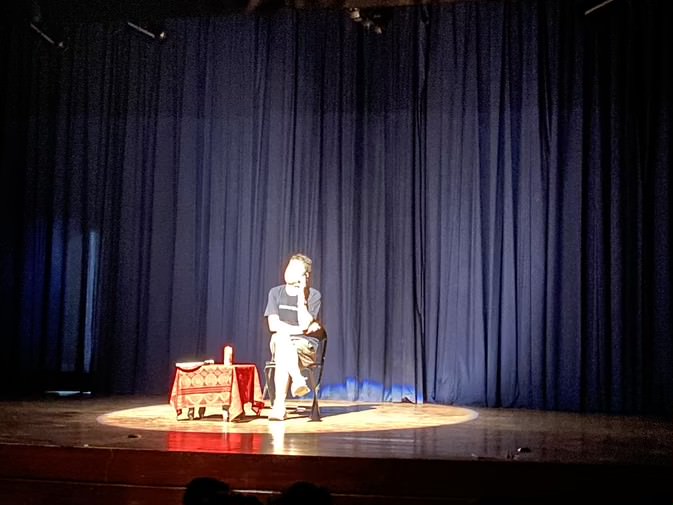On 27th December 2024 at Delhi’s LTG Auditorium in Mandi House, the theatrical ‘Ghalib in New Delhi’ completed its 602nd play. On the same day approximately 200 years ago, the famous poet Mirza Ghalib was born. On his 227th birth anniversary, a play based on Ghalib’s character was performed at Delhi’s local theatre hub. When the curtains fell at the end of the show, the audience stood in applause for Dr M Sayeed Alam. A Delhi-based theatre practitioner, Dr Alam wrote, directed and enacted the character of Ghalib in ‘Ghalib in New Delhi’.
The Play: Ghalib in New Delhi
‘Ghalib in New Delhi’ is a blend of the history and the present. It brings alive the character of the 18th-century Urdu poets into the contemporary socio-political and cultural atmosphere of the capital city, Delhi. With a seating of more than 300 people, the play gathered laughter throughout its course. This Sayeed Alam-directed play was written in simple Hindi language and was a perfect mix of history and comedy. From the current regime to the marketing tactics of the corporates, the play could comment satirically on all. While a few dialogues gave beautiful Urdu prose to the audience, other dialogues would make people laugh.
The latter half of the play grabs the audience’s attention when the central character walks down the stage and starts to interact with the audience.
‘Ghalib in New Delhi’ was staged by an organisation founded by European linguist Ashok Puran in 1989, the Pierrot Troupe. Dr Alam is now an integral part of this theatre group. Belonging to a middle-class family, Dr Alam initially took up a job at an Iranian news agency. Soon, tired of hiding and juggling between jobs, he decided to leave everything and pursue theatre full-time.
Dr Alam has been an active theatre practitioner since 1994 and has performed more than 50 plays till date. Other than ‘Ghalib in New Delhi’, he is also known for works like ‘Maulana Azad’, ‘Cut…Cut…Cut’, ‘Sons of Babar’ and others. With his contributions to Urdu and Hindi theatre, Alam has often used theatre to register dissent. In his personal life, Dr Sayeed Alam is greatly inspired by the works of Mirza Ghalib and theatre and cinema practitioner, Tom Alter.
Recalling his politically tuned performance in front of former Prime Minister, Dr Manmohan Singh, he told a New Delhi-based media outlet, “Theatre protects a culture and its literature, and simultaneously makes it accessible to the masses.” For Alam, it is a must to protect theatre from turning into another propaganda in the current times.
Delhi’s Mirza Ghalib
Mirza Asadullah Baig Khan (1797 – 1869), known by his pen name Ghalib or Asad, was an Urdu and Persian poet who lived most of his life in old Delhi’s Ballimaran.
Ghalib wrote his first verse at the age of 11. In most of his works, the gender of the beloved is never known. Being a member of a decline in Mughal nobility, Ghalib greatly depended on either royal patronage or borrowings from friends. During the reign of the Mughal Empire, he could never get his full pension reimbursed and lived most of his life under financial strain. It was during this time that he chronicled the Mughal history inside the capital city.
Known as the greatest Urdu poet, Ghalib’s love for Delhi has time and again revitalised the spirit of the city.
“Ik roz apni rooh se poocha, ke dilli kya hai,
toh yun jawab me keh gayi,
yeh duniya maano jism hai aur dilli uski jaan”
(I asked my soul, what is Delhi?
It replied, ‘The world is the body, Delhi its soul.’)


